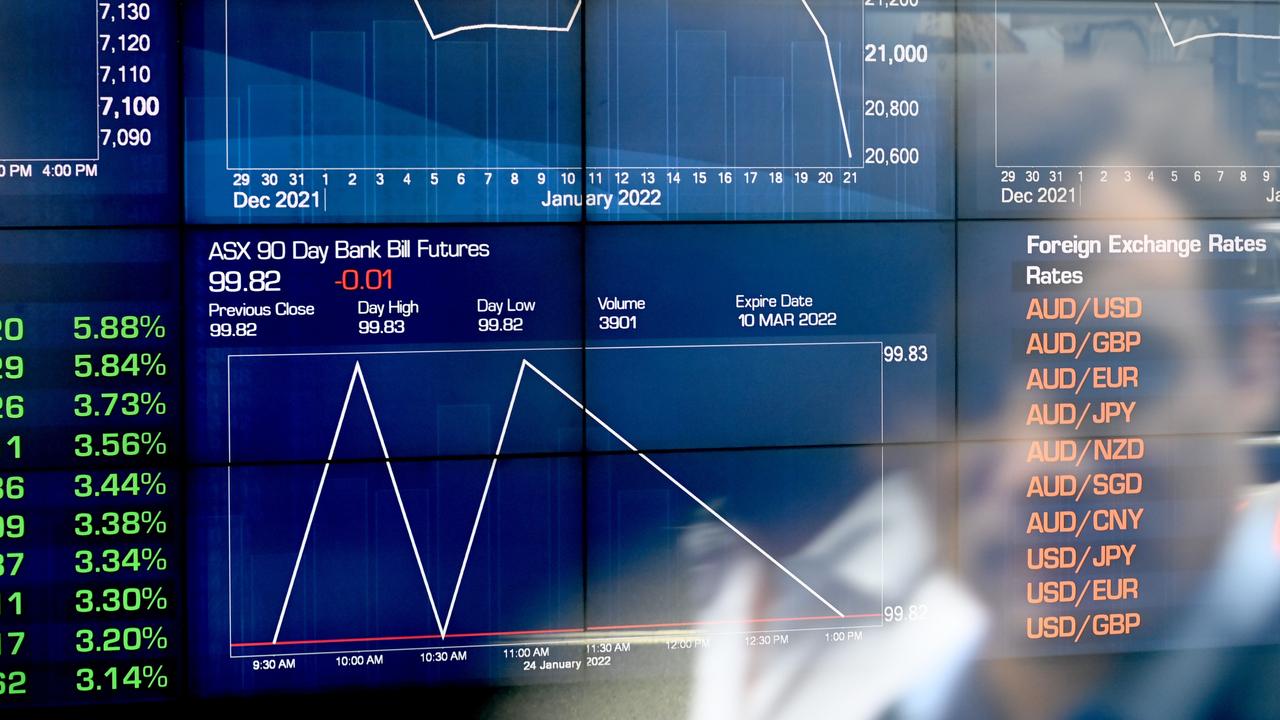ASX has worst January since 2008
The ASX closed barely changed on the final trading day of the month, but officially notched up its worst start to the calendar year in 14 years.
The Australian sharemarket closed barely changed despite a positive lead from Wall Street, with banks among those weighing down the local bourse.
After briefly returning above 7000 points, the benchmark S&P/ASX200 index finished 16.5 points or 0.24 per cent lower at 6971.6.
The All Ordinaries Index, comprising Australia’s 500 biggest stocks, was just two points higher at 7268.3.
Ord Minnett said US stocks rose strongly on Friday in volatile trade, with the major indices having their biggest gains of the year and snapping a three-week losing streak.
IG market analyst Kyle Rodda said stocks in Asia, where trading had been thinned by Lunar New Year, were on the front foot, while European and US futures were edging up.
But the ASX hadn’t really participated in the move higher.
“Thank the banks for that one,” Mr Rodda said.
ANZ slumped 3.42 per cent to $26.53, Commonwealth Bank gave up 2.02 per cent to $93.74, National Australia Bank backtracked 1.88 per cent to $27.13 and Westpac shed 1.6 per cent to $20.30.
CommSec said this January was the ASX’s worst start to the calendar year in 14 years.
One of its market analysts, Steven Daghlian, said trade was cautious on Monday ahead of a big week in economic news, kicked off by the Reserve Bank of Australia’s first board meeting of the year on Tuesday.
“Last week we had an update on inflation, which was much stronger than expected in Australia and the US central bank, the Federal Reserve, also made it quite clear that it looks like (interest) rates are going to rise in the US for the first time in four years, sooner rather than later,” Mr Daghlian said.
The RBA is expected to keep the cash rate at a historic low, with a speech by RBA governor Philip Lowe to the National Press Club in Sydney following on Wednesday and a quarterly update on monetary policy on Friday.
“All three will be important for different reasons, but simply put, there could very well be a change in tone by the RBA, updated forecast about inflation as well and it could change the picture when it comes to higher interest rates over the course of 2022,” Mr Daghlian said.
He said Lunar New Year meant the Shanghai Stock Exchange would be closed all week, while Hong Kong, Singapore and Korea would have interrupted trade, “so that could mean we don’t get regular updates on iron ore prices”.
OMG chief executive Ivan Tchourilov said consumer staples also weighed heavily in a volatile trading session.
Woolworths slid 1.35 per cent to $34.42, Coles gave up 2 per cent to $16.20 and Metcash declined 1.25 per cent to $3.95.
“ARB Corporation has had a strong showing in trading today, up 7.9 per cent to $46.15,” Mr Tchourilov said.
“The automotive accessory maker has had a rough start to the new calendar year.
“However, off the back of an impressive announcement of sales revenue growing 26.5 per cent in the back half of last year, the stock has rebounded with confidence.”
He said another standout was Mayne Pharma Group, up 4.17 per cent at 25 cents after suffering losses last week.
“Ansell tumbled 14.34 per cent to $26.76 after announcing that its unaudited EBIT is down about 25 per cent from the first half to the second half of last calendar year,” Mr Tchourilov said.
“The downward trend is due to the drop-off in demand for Covid-related supplies (medical gloves), and investors immediately responded with a massive sell-off.”
In the energy sector, FAR Ltd suggested it was unimpressed by Samuel Terry Asset Management’s 45 cents per share takeover bid, saying it “recognises that FAR’s shares are undervalued”.
The bidder already has a 4.9 per cent stake in FAR, which rocketed 28.77 per cent to 47 cents on the back of the offer.
Pilbara Minerals issued its latest activities report, saying surging lithium prices had driven record quarterly operating cashflow despite the impact on production from commissioning, ramp-up delays and labour shortages.
“The company continues to work with its key contractors to find innovative solutions to try to maintain appropriate manning levels that support ongoing operations,” the miner said.
Shares in Pilbara Minerals slipped 0.62 per cent to $3.20.
BHP lost 1.22 per cent to $46.35 after confirming the first Covid case at its all-important Pilbara iron ore mines.
Copper and precious metals miner 29Metals confirmed the same for its Murchison operations and its shares eased 0.76 per cent to $2.63.
Rio Tinto weakened 1.93 per cent to $111.56 and Fortescue lifted 2.16 per cent to $19.87.
Mr Tchourilov said gold producer Resolute Mining was a poor performer, dropping 3.39 per cent to 28.5 cents, continuing a downward trend going back to the start of the new year.
The Aussie dollar was fetching 70.25 US cents, 52.32 British pence and 62.89 Euro cents in afternoon trade.
Originally published as Australian sharemarket has worst start to calendar year in 14 years, falling 6.35pct in January
For all the latest business News Click Here

